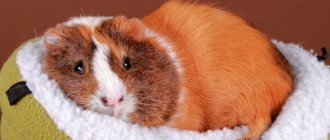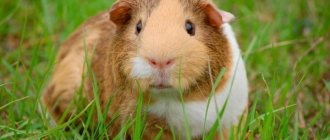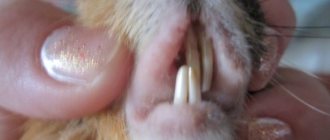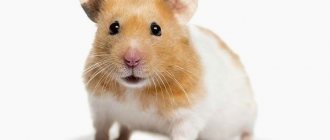All pig sounds have meaning and are a way of communication. With the help of its voice, a guinea pig shows its dissatisfaction, asks for food, and communicates with humans and other animals. Each rodent has its own ways of expressing emotions and desires, but there are sounds whose meaning is the same for all members of the species. So, every pig in certain situations squeaks, whistles, chatters its teeth, purrs, hisses, chirps. Experts distinguish more than 10 sounds made by these funny animals.
Why does the pig squeak?
Usually, owners quickly begin to understand what the pet wants to say with one sound or another. Most often, the animal begins to squeak when you pet it. In this way the animal expresses its satisfaction. If the guinea pig is happy with its living conditions and is in a good mood, then it can quietly squeak and grunt all day. Therefore, in a situation where a pet constantly squeaks, there is nothing strange or alarming.
When should you be wary?
If a pet suddenly begins to squeak loudly or chatter its teeth loudly, owners should be wary. Since such sounds indicate pain or fear. The first thing you need to do is check if the animal is injured.
You should also be wary of teeth grinding. This indicates that the incisors are not growing properly and are not worn down, or that the pig has parasites that adversely affect its overall health. If you do not contact a veterinarian, the animal may completely refuse to eat and die. Also, strong tapping of the incisors may indicate pain in the abdomen and upset stool. To alleviate suffering, the animal vigorously chatters its teeth, relieving pain.
Attention: any sharp and shrill sound from a guinea pig should alert owners. After all, this is how the animal tries to convey that something is bothering or bothering it.
Why does my pet whistle?
Often, when returning home, owners notice that their pet has risen on its hind legs and is whistling loudly. This is how the animal shows that it missed its owner and is glad to see him. Rodents also whistle when it's time for a snack. A hungry pig whistles when it sees a treat in its owner's hand or when it notices that the feeder is already empty. Owners who are annoyed by the constant whistling of a rodent are advised to put more food in the feeder so that the pet remains full longer and does not require supplements.
Possible reasons
First you need to determine why your pet acquired this unusual habit. There are several factors that cause guinea pigs to chew on their cage.
Lack of space
To properly keep these rodents at home, you need a cage with a size of 100x80cm, but it is better to use a larger enclosure. The tightness of the cage can negatively affect the animal's psyche. The pet expresses psychosis and nervous tension by biting and tugging at the rods.
Discomfort
If the animal does not have a shelter or a house or a comfortable place to sleep, it will also be constantly tense, so it will try to convey its emotions to its owner.
Boredom
If the pig is kept alone and there are no toys in the cage, it will be bored and demand the attention of its owners. A loud whistle and noisy gnawing of twigs usually forces a person to approach, so the animals quickly learn to call their owners in this way.
Loneliness
Pigs have a high level of sociality, so the absence of relatives can make them depressed and stressed. In this case, the rodent squeaks and bites the bars, expressing its emotions from the lack of communication.
Pigs are social animals and need attention.
Hunger or lack of micronutrients
Usually, complete food from the store contains the entire complex of necessary substances, but sometimes the animal may lack certain vitamins and elements. Hunger also forces him to try to attract the attention of his owner.
Grinding down teeth
Eating solid food usually helps sharpen your guinea pig's teeth, but sometimes it may not be enough. If there is no mineral stone for guinea pigs, twigs, or wooden parts in the cage, the pet can switch to rods.
IMPORTANT: The habit of gnawing on a metal cage not only causes anxiety to the owner, but can damage the health of the animal. Particles of paint that fall off the rods can injure the mucous membranes of the oral cavity and esophagus, causing inflammation and poisoning. A mumps can also break or chip part of a tooth, which will require a mandatory teeth trimming by a veterinarian.
What do the movements of guinea pigs mean?
Guinea pigs are not only sociable animals, but also active ones. The well-being and mood of the animals can be determined by their movements.
- If a rodent stands on its hind legs and stretches out its front limbs, then in this way it shows itself and tries to please a person.
- A male sharply throwing back his head demonstrates his superiority over other males. This is how an alpha male behaves.
- And the male, who lowers his head, shows his submission to the alpha male.
- An animal with its body stretched forward shows alertness and studies the situation.
- A rodent opening its mouth wide and showing its teeth is showing aggression and is preparing to bite.
- The jumping pet is in a good mood and wants to play with its owner.
- If the pig is trembling, pressing into the corner of the cage, hiding its paws, then it is very frightened, feels unprotected and helpless.
- If the animal freezes and enters a state of stupor, then it pretends to be dead. This is usually how pigs behave when they sense danger.
It is also important to consider how the rodent behaves in human hands. If your pig is restless and twitching, it means she wants to defecate or is tired from playing. In this situation, the owner should return the animal to the cage.
Many pampered rodents throw their heads back when in human hands. This is how they show their irritation and want their owner to leave them alone.
It is believed that by licking the owner's hands, the pig shows his love. Maybe it is so. But, most likely, the animal simply liked the smells that permeated the skin of its owner’s hands.
Generally, guinea pigs love it when their owner picks them up from their cage. At first, the cubs behave timidly in human hands, but quickly get used to communicating with humans. Adults often cuddle and cuddle with their beloved owner.
How should a person react if a rodent chatters its teeth?
If a pet shows concern, owners should be wary. The first thing you need to do is check if everything is okay with the animal. Perhaps he does not like the temperature in the room (too cold or hot), he is negatively affected by loud sounds coming from the TV, strong odors, and the like.
With prolonged aggression on the part of a guinea pig, the most common causes are:
- unpleasant proximity to relatives;
- tight cage;
- new items in the cage.
When buying a guinea pig, you should not immediately buy it new toys, a neighbor, a house and other little things. Let the animal get used to the move and its new owners, and only then gradually add objects that are unfamiliar to it. Thus, the pig will watch with interest the changes taking place around him and will understand that they do not pose any threat to her.
This cute creature needs close communication with its owner. The animal should always be picked up, stroked and talked to. Otherwise, the pig will be bored alone, chatter its teeth menacingly and show dissatisfaction in every possible way. As a result, she will constantly chew the bars of the cage and scatter food around the cage.
All guinea pigs are individuals. But they equally express their emotional state with different sounds. The owner’s main task is to listen to them and be able to recognize what the pet wants and what its mood is.
Hums
Rumbling sounds can have a variety of meanings, depending on the position you are currently occupying. If the pig is currently feeling content and happy, then it will emit a guttural rumbling against the background of absolute relaxation and ease. However, if the rumbling sounds have a higher pitch, then the animal is most likely irritated by something. Tension in movements will also indicate this. If you take a closer look at the pet, you can see that it trembles while purring. But abrupt rumbling sounds clearly indicate that your pig is scared or feels uncomfortable.
And he behaves strangely...
Owners who have recently acquired new “tenants” are often bothered by the squeaking of their charges in a variety of situations.
Problems with stool and urination
Does he squeak when he goes to the toilet? Often such a sound is accompanied by the need to cope with natural needs - both small and large needs.
In this case, you first need to simply observe the further behavior of the animal. If a slight inflammation occurs, then simply ensure your pet is clean and warm in the cage. However, a squeak can be a signal of disorders both in the genitourinary system and in the gastrointestinal tract. In this case, it is necessary to urgently take the animal to the local Aibolit.
And suddenly it bites!
Pets can squeak when they are angry. It was already noted above that squeaking can mean dissatisfaction or protest.
The same applies to bites. Most often, they can be “rewarded” by an animal that is unwell, and against its will (he doesn’t realize that for purely humane reasons!) they take it in their arms - how can you not be indignant!
Listen to the sound. https://xvostus.com/wp-content/uploads/2018/02/zvuki-morskih-svinok-svinka-vozmuschena.mp3
And good luck, and the treatment procedures will begin. Here both teeth and voice will come into play.
The same applies to pregnant females, who are annoyed by any attempt to invade their personal space.
Are your teeth itching?
Gnawing on the bars is not dangerous. Owners often notice that the guinea pig seems to be gnawing on the bars of the cage. And the question naturally arises: maybe this is how she grinds her teeth down?
In such cases, experts reassure: the rodent clamps the rod in a completely different area from where the teeth are. Simply the chewing movements made make this sound quite loud. It may also be accompanied by a squeak.
Sociable pigs locked in a cage suffer greatly from loneliness and gnaw at the cage “out of grief”; this is rather a type of pig psychosis, which, however, is easily curable. All you need is:
- place the pet in a larger cage,
- give the opportunity to actively move in a special pen or even on the floor,
- place a friend in the home, remembering that the animals must be same-sex (to avoid unplanned reproduction),
- provide food in sufficient quantity.
Active running and jumping
Squeaks and runs? Most often, this is how complete satisfaction with life is expressed. This behavior is especially typical for young individuals. They cheerfully rush around the cage squealing and hooting, infecting older pigs with their delight.
At the same time, noise, fuss, squeaking, and whistling are heard. This does not last all the time, so there is no cause for alarm.
However, it may happen that the movements of the animals are too active and restless; running alternates with jumping and is also accompanied by squeaking; pigs itch periodically.
Carefully examine your pet's fur and skin, paying special attention to dandruff, bald spots, sores, and hair loss. If such signs are present, we can assume the presence of a fungus, subcutaneous mite or lice
Does your pig squeak often?
Yes, all the time! No, rarely.
Negative signals
A frightened guinea pig will say a dull “Urrrr”, similar to a vibrating alert on a phone, and will tremble slightly. But she indicates irritation with a short sharp squeal - for example, when you carelessly touched her. If the pig is angry, it squeals for a longer time, while clicking its teeth, as if warning: “I’m not in the mood for jokes!”
One of the most impressive sounds a pig makes can be heard at night. This is a very sharp intermittent squeak, similar to the cry of a bird caught in a snare. At the same time, the pig freezes in place, her gaze glazes over. An inexperienced owner may be afraid for his pet. This sound is used by pigs to call their relatives. Little pig babies can express their fear this way.
If the pig is hungry, you won't miss it. She will stand up and scream shrilly throughout the apartment: “Wee-wee-wee!”, moving her ears. It’s amazing how loud such a small animal can be! Guinea pigs study their owners. They usually remember sounds, such as the sound of a knife hitting a cutting board when preparing a salad or the rustle of a bag from which cabbage is taken out. Subsequently, upon hearing these sounds, the pigs whistle invitingly. They also have a well-developed sense of smell. So you’re unlikely to be able to quietly snack on a cucumber; the alarm will immediately go off!
Very often the guinea pig makes sounds.
There is nothing strange or surprising about this.
These animals are quite sociable. They show their emotions and mood through sounds. There are several reasons why a guinea pig whistles.
An animal's whistle may indicate that the animal wants to eat or get some tasty treat. This most often happens in the morning. In such cases, pets very often stand on their hind legs
In this way they attract the person's attention and greet him.
Sometimes you can notice a quiet purring. Animals show their pleasure with these sounds. Most often, such purring can be heard after eating.
Guinea pigs whistle
when they want to warn family members or cohabitants about possible danger. Males can also show that they are the main ones in this family. Sometimes this whistle sounds like a loud roar. Most likely the animal is sorting things out. This is absolutely normal.
Quite often it is baby guinea pigs who squeak. This means that kids are afraid of something and are trying to warn others. To ensure that babies squeak less and are not afraid, you should not immediately separate them from their mother. At first, they should get used to it and become more independent. Leaving them with mom will save them some extra stress.
Why does a guinea pig squeak?
It is also possible that your guinea pig is squeaking because it is in pain or discomfort. The squeak in such cases is a cry for help. This way the pig can report its illnesses. For example, with constipation, you can hear a pitiful squeak
Do not forget that with sounds the animal tries to attract the attention of other individuals or humans. Therefore, if you hear a squeak, it is better to approach the animal and understand what it wants to tell you.
A guinea pig's growling may be a sign of fear of another animal. A guinea pig can also growl if you hold it in your arms for a long time, but it doesn’t want that.
Over time, you will begin to understand your pig's language. You will know why she squeaks, screams or growls. Each guinea pig has an individual voice and timbre.
You can call a veterinarian to your home. He will provide you with quality medical care and advice. In case of injury or illness, he will prescribe the correct effective treatment.
Prevention of parasites
If any type of parasite is detected in your pig, you should immediately seek help from a professional. Of course, the best treatment for worms is their prevention . However, the opinions of many experienced breeders are divided on the need for preventive treatment of animals. Some of them believe that if the pet is kept clean, has high-quality sanitary conditions, and is provided with a nutritious, balanced diet, its chances of “getting” parasites are negligible.
Therefore, there is no need to specifically use chemicals for prevention. Other rodent breeders believe that regular professional treatment, the same as that given to other pets, will not harm their pets. For the procedure, drugs intended for kittens are used, but the weight of the pig is taken into account - “Dirofen”, “Prasicide”. Whether or not to use drugs to prevent parasites is up to each guinea pig owner to decide for himself.
However, every breeder is obliged to keep the cage, drinking bowls, feeder and any other rodent accessories clean . Guinea pigs are surprisingly active, cheerful and funny pets that, unlike other rodents, have a wide range of sounds. Each sound is evidence of the expression of one or another emotion of the animal. It is important to learn to recognize the sound signals, as some of them can be a sign of serious health problems.
Chirps/Tweets
A guinea pig chirping is a rare occurrence. Not all rodents make such sounds. It really is very reminiscent of birds chirping.
Chirping pets exhibit strange behavior, similar to a state of trance. Typically, a guinea pig sings for no more than 20 minutes, after which it returns to its business.
Decoding behavior
Scientists who observed animals came to the conclusion that the guinea pig chirps:
- in a state of strong excitement;
- under stress;
- after a quarrel with relatives or being socially overloaded.
Variety of breeds
Species diversity is characteristic not only of dogs and cats, but also of guinea pigs. The photos demonstrate that there are both short-haired and long-haired breeds. The conditions of detention are the same for all, with the exception that long-haired dogs need to be combed and, in some cases, trimmed. The most popular breeds are:
- American Teddy;
- English self;
- satin;
- alpaca;
- skinny;
- Himalayan;
- Peruvian;
- Abyssinian;
- Sheltie;
- texel;
- crested.
They all have differences in coat type and color, as demonstrated by photos of guinea pigs. In addition, there are outbred smooth-haired and rosette pigs. Everyone is equally good-natured, trusting and timid, which makes them incredibly cute.











